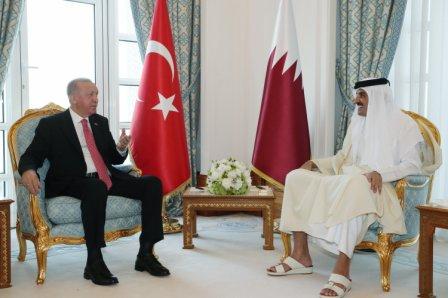Turkey and Qatar’s Covert War on Somali Federalism: A Geopolitical Assault on Sovereignty
By Warsame Digital Media (WDM) | X: @ismailwarsame
As Somalia struggles to stabilize after decades of civil war, foreign powers are quietly waging a shadowy campaign to dismantle its fragile federal system. At the heart of this scheme lie Turkey and Qatar, two nations leveraging financial clout, ideological extremism, and historical paranoia to impose a centralized authority beholden to their interests—with President Mohamed Abdullahi “Farmaajo” serving as their chief proxy.
Turkey’s Obsession with Centralization: A Legacy of Fear
Turkey’s vehement opposition to federalism is rooted in its own existential anxieties. The collapse of the Ottoman Empire—a trauma etched into the nation’s psyche—and modern fears of Kurdish separatism have cemented Ankara’s obsession with centralized control. “Turkey views any form of decentralization as a prelude to fragmentation,” explains Dr. Leyla Ahmed, a regional analyst. “Its support for a unitary government in Somalia isn’t about stability—it’s about replicating its own authoritarian model abroad.”
This paranoia extends to Somalia’s Federal Member States (FMS), which Turkey perceives as obstacles to its economic ambitions. By propping up Mogadishu’s central government, Ankara ensures preferential access to Somalia’s ports, resources, and military contracts. Critics argue that Turkish “investments,” like the $50 million embassy compound and training of Somali forces, are less about aid and more about entrenching influence.
Qatar’s Toxic Alliance: Arab Nationalism and Extremist Ideals
Qatar’s role is equally insidious. Doha’s blend of pan-Arab nationalism and patronage of Islamist groups has bred a hostility toward federalism, framed as both treasonous and blasphemous by its extremist allies. The Gulf state’s funding of Muslim Brotherhood-linked factions in Somalia aligns with its broader strategy to undermine pluralism, replacing it with a homogenized, Qatar-friendly governance.
“Federalism empowers regional identities—something Qatar’s ideological partners see as a threat to their vision of a monolithic Islamic state,” says Omar Hassan, a researcher at the Sahan Institute. This alignment has turned Qatar into a bankroller of destabilization, funneling “unaccountable cold cash” to silence dissent and coopt political actors.
Farmaajo’s Puppet Regime: The Turkish-Qatari Nexus
President Farmaajo’s administration has become a conduit for this anti-federalist agenda. His government’s aggressive efforts to sideline FMS leaders—cutting off revenue streams, withholding aid, and deploying intelligence operatives—mirror the playbook of his foreign backers.
Key to this strategy are two figures: Fahad Yasin, head of Somalia’s National Intelligence and Security Agency (NISA), and Afyare Elmi, a Qatar-based academic. Yasin’s controversial policy paper, Puntland: Preferential Treatment in the Union or Secession, openly advocates for dismantling federalism, urging Mogadishu to strong-arm Puntland into submission. Elmi, meanwhile, provides intellectual heft to Qatar’s agenda, framing decentralization as a “Western plot” incompatible with Somali unity.
Puntland Under Siege: The Last Federal Bulwark
Puntland, Somalia’s oldest and most stable FMS, now faces unprecedented pressure. Reports suggest Turkish and Qatari operatives have infiltrated political circles, stoking internal divisions to weaken its autonomy. “Puntland is in the crosshairs,” warns Puntland Senator Fatima Jibril. “Their goal is to collapse our institutions so Mogadishu—and Ankara—can seize control.” Some analysts urge Puntland to temporarily disengage from Mogadishu until the power struggle subsides. Others propose a more radical solution: transitioning to a confederal system, granting regions greater sovereignty to resist external manipulation.
A Call to Action: Sovereignty at Stake
The Turkish-Qatari meddling represents not just a threat to Somali federalism, but to the nation’s very sovereignty. “This isn’t about helping Somalia—it’s about recolonizing it under a puppet regime,” asserts former diplomat Abdiwali Mohamed.
As Mogadishu escalates its war on federalism, the international community remains conspicuously silent. For Somalia’s regions, the choice is stark: succumb to foreign-dominated centralization or fight for a decentralized future. The survival of Somali democracy may hinge on the answer.
END
Warsame Digital Media is an independent outlet covering Horn of Africa politics. Follow us for in-depth investigations at @ismailwarsame; www.ismailwarsame.blog


COMMENTS
b8kz60